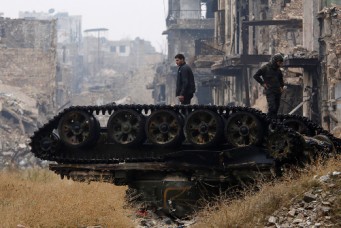Complexities and Perplexities in the Arab World
That it is Russia and the United States who are signaling future developments in Syria is not a good sign of a stable situation to come.
The American-Russian announcement Thursday of a possible ceasefire in Syria within a week raises hopes that the Syria war might slow down and perhaps end one day, but the manner in which this announcement happened tends to minimize hope for the war’s end, I fear. Foreign powers signaling future developments in Syria is not a good sign of a stable situation to come.
Syria is the place that still captures the complexities of statehood and society challenges in the Middle East, which tend to elicit perplexities in the policies of most foreign powers. This is partly a function of political geography that goes back millennia, and is not peculiar to our time. Many regional and world armies in the past five millennia—Greece, Rome, Byzantium, Persia, Crusaders, Egypt, Parthia, Ottomans, France, Great Britain, and Islamic dynasties—have repeatedly occupied this land, fought over it, or sought to control it through local proxies.
Two thousand years ago, Syria was a critical link in the Limes Arabicus line of Roman fortified frontier posts each located a day’s ride from each other, along the frontier from the Black Sea to the Red Sea that separated the civilized world from the barbarians, in Rome’s eyes. Many of those forts remain standing today, and are tourist attractions for many foreigners; yet they are also sentinels of the land’s persistent role in human political history. Regional and global powers today replay the same kind of geo-strategic rivalries that caused emperors and caliphs to build those forts and battle for this frontier region in the past. The continuing imperial nature of the competition among regional and global powers for incumbency and power in Syria remains the dominant reality.
So it was not surprising that the Syria ceasefire announcement was made by the American and Russian foreign ministers in a meeting of many countries in Germany, far away from the battleground and the fighters on the ground. In this realm, the United States is at something of a disadvantage, given the two contradictory trends that shape its foreign policy: a willingness to use its immense military force around the Middle East as needed, alongside popular fatigue among Americans with being engaged in ground wars there, after unhappy and costly adventures in Vietnam, Afghanistan, and Iraq.
American policy in Syria also captures this contradiction, as the Barack Obama administration remains willing to fight a little bit here and there, but is consistently unsure about how to match its immense military might with its sustained amateurism in engaging with the underlying drivers of conflict in our region. These critical drivers are social-economic needs and growing inequalities among politically marginalized citizens, living in environmentally stressed landscapes that have been ravaged by many decades of brutal family/military rule. That sustained autocratic rule has been consistently and enthusiastically supported by the United States, Russia, and European powers. The continuing cycle of local Arab dictatorships with foreign power support leading to frail and fractured statehood seems impossible to break.
As the Arab political order of the last seventy years starts to fragment and occasionally collapse into multiple civil wars that coincide with regional ideological rivalries among Iran, Turkey, Saudi Arabia, and Israel in the first instance, the big powers react very differently. The United States seems confused, not sure whether to continue to support Arab autocrats or to back popular struggles for democratic pluralism, and in the meantime uses its military powers to perpetuate warfare and chaos in Syria, Yemen, Palestine, Iraq and elsewhere when an opportunity arises.
The Russians, on the other hand, suffer few uncertainties. They support the Syrian government with direct military action, unburdened by domestic popular sentiments, international law, local reactions, or anything else. Iran does the same. The United States remains one of the most powerful forces for war, chaos, and trouble around the world, but people in distress around that same world always seem to look to the U.S. to step in and save them. That is what happened when the United States led the aerial attacks against the Islamic State in Iraq and Syria (ISIS) in summer 2014; it continues to happen in the many demands for the U.S. to step in and help the rebels and do something about the humanitarian catastrophe in Syria. This is romantic wishful thinking, it seems.
Russia is a relatively closed and top-heavy society where public debate is rare, unlike the United States where public debate, especially in a presidential election year, is robust and specific—except on foreign policy. The United States and Russia have different styles, but there seems to be very little difference in the ultimate outcomes of their foreign policies in the Middle East; they both disregard the rights and aspirations of indigenous citizens, support brutal regimes, try to change leaders and systems they do not like, and engage in direct military action where and when they deem fit. Regional powers now do the same thing, giving a new twist to the ancient imperial realities that have long plagued our region.
Rami G. Khouri is published twice weekly in the Daily Star. He was founding director and now senior policy fellow of the Issam Fares Institute for Public Policy and International Affairs at the American University of Beirut. On Twitter: @ramikhouri.
Copyright ©2016 Rami G. Khouri — distributed by Agence Global


